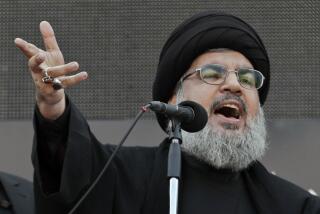Hamas Leader the Ultimate Survivor
GAZA CITY — First up was Al Jazeera. Then came the BBC. Ismail Haniya, the voice and face of the Islamist group Hamas, was hustled from one interview to the next, flanked by watchful, bearded bodyguards and trailed by a retinue of camera crews.
Haniya was Hamas’ top candidate in parliamentary elections Wednesday that yielded a stunning upset victory for the Palestinian militant group. Now it has fallen to him not only to lead a movement that is deeply conflicted about its unexpected electoral triumph but to try to rehabilitate the international image of an organization best known as one of the lethal pioneers in suicide bombings, which have maimed and killed hundreds of Israelis.
Haniya, who at 46 has a barrel chest and a neatly trimmed gray beard, maintains something of the air of the academician he once was. He speaks in clipped, compact sentences, keeping his voice as level as his gaze.
Haniya, who is among the youngest of Hamas’ founding members, carries the mantle by default. He is one of the few members of its top leadership to have escaped assassination during Israel’s concerted campaign of “targeted killings,” which began in the summer of 2003 and trailed off about a year ago.
Haniya had a close call during that era. In June 2003, an Israeli air force F-16 bombed a third-floor Gaza City apartment where a Hamas meeting was underway. Haniya, then an aide to the group’s spiritual leader, Sheik Ahmed Yassin, left seconds before the blast and escaped with light injuries. Yassin was killed the following year in an Israeli missile attack.
Haniya played an important behind-the-scenes role as Yassin’s chief of staff, a post he assumed in 1998. He rose to prominence as other senior figures were targeted by Israel, including Yassin and Abdulaziz Rantisi, who was killed a month after succeeding Yassin.
Like many of his Hamas contemporaries, Haniya was marked by his experiences in prison and as a refugee. During Israel’s war of independence, his parents fled their home near what now is the Israeli city of Ashkelon. He was born and brought up in the Shati refugee camp in Gaza City, a warren of sewage-scented alleyways where he still lives.
When he arrived Wednesday at a polling place in the camp to cast his vote, people pressed forward and greeted him with deference.
Among the Hamas hierarchy, Haniya has been considered a leader of the group’s pragmatist wing. He also served for several years as Hamas liaison to the Palestinian Authority at a time when tensions between the two were high.
Haniya, who speaks serviceable English but prefers to conduct interviews in Arabic, earned a degree in Arabic literature from Gaza City’s Islamic University, of which he later became dean. It was there that he was initiated into Islamist politics, gravitating toward a movement that would soon coalesce into Hamas.
In 1992, he was part of a group of hundreds of Hamas and Islamic Jihad militants expelled by Israel to southern Lebanon. Most were permitted to return but not before being introduced to what was then an exotic new weapon: the suicide bomb.
Haniya went to jail for the first time in 1987, at the onset of the Palestinians’ first intifada, or uprising. His first prison term was short but was followed quickly by a six-month stretch in 1988 and a three-year stay that began in 1989.
Haniya is married and the father of 11 children. An Israeli television journalist, Shlomi Eldar, recounted a trip to Gaza a decade ago, during which he met one of Haniya’s sons, then 6.
When he asked the child what he wanted to be when he grew up, the boy replied, “A shahid” -- a martyr. Eldar said he had another encounter Thursday with that son, now a teenager, who asked him what he thought of the election results.
“I think your father is probably going to be Prime Minister Haniya sometime soon,” Eldar said he told the boy, who responded with a smile and a high-five.
More to Read
Sign up for Essential California
The most important California stories and recommendations in your inbox every morning.
You may occasionally receive promotional content from the Los Angeles Times.









